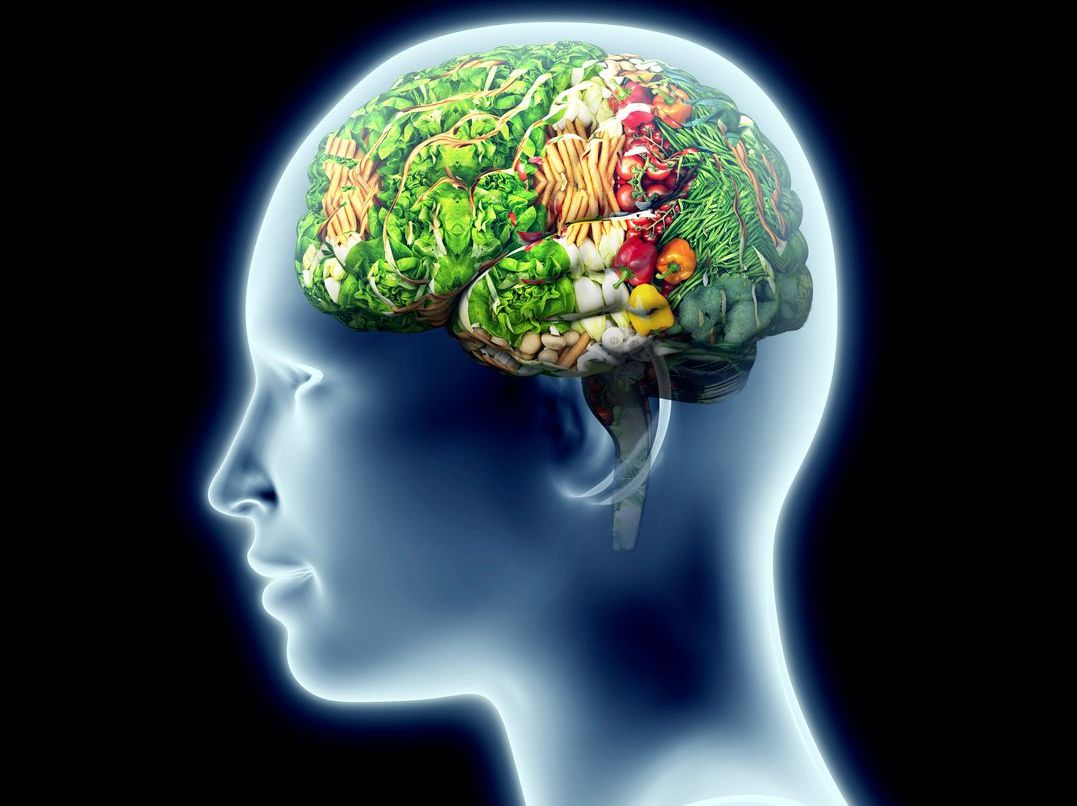Nutritional psychiatry has been called the “mood-food” science. It’s an emerging field that examines the impact of dietary choices on mental health. Along with how we can use food and the gut-brain connection to naturally improve our mood, support emotional well-being, and build resiliency.
A seminal study by Jacka et al. (2010) in the American Journal of Psychiatry was a pioneer in nutritional psychiatry. It demonstrated that there is a significant link between the quality of the food we eat and the predominance of mental illness we face. When I refer to mental illness, I mean anxiety (which nearly all of us deal with on some level) that can be mild or extreme. As well as a variety of mild to moderate mental health disorders, such as chronic depression or seasonal affective disorder.
The connection found by Jacka et al. hypothesizes that nutrient-rich diets that contain fruits, vegetables, fish, and whole grains positively influence neurotransmitter and brain protein production. These two things are vital for mental well-being (including things like emotional health, mental and emotional stability, sense of ease, self-awareness, etc.).
So, what they’re saying is that by positively affecting the production of these things in the brain, a nutrient-rich diet (paid link) can effectively lessen anxiety and depression (among other psychiatric disorders). Since then, much of the other peer-reviewed nutritional psychiatry research has supported these findings.
Key Takeaways
- The connection between diet and mental resilience
- The impact of micronutrients on health
- Healthy eating plays a multifaceted role in maintaining mental wellness
Nutritional Psychiatry: Diet, Gut Health, and Mental Disorders

The relationship between gut health and mental well-being is a critical aspect of mental resilience. The gut-brain axis, a communication network linking the gastrointestinal tract and the brain, is influenced by the gut microbiota. A diet high in fiber, probiotics, and fermented foods supports a healthy gut microbiome, which positively impacts stress response and emotional regulation.
A study by Foster and McVey Neufeld (2013) in Nature Reviews Neuroscience emphasized the role of the gut microbiota in modulating the stress response, suggesting that a healthy diet can bolster mental resilience.
Nutritional Psychiatry Research

The intricate relationship between diet and mental and emotional health has emerged as a focal point in both nutritional and psychological research. Recent research indicates a strong link between dietary patterns and the risk of developing mental health and mood disorders, such as depression and anxiety.
The growing interest in the gut-brain axis and exploring how gut health is influenced by diet and affects mental well-being has led to huge advances in treating mental disorders. Clinical trials show that dietary interventions, like the Mediterranean diet, can improve mental health outcomes.
There is more research to do. However, science now has a greater understanding of the mechanisms underlying these relationships, which can be applied to developing personalized dietary recommendations to support mental and emotional health.
Mental Health Disorders and Dietary Patterns

Certain dietary patterns, such as the Mediterranean diet mentioned above, have been associated with a lower risk of mental health issues. The SUN Project (2015), a cohort study published in the Archives of General Psychiatry, found that adherence to a Mediterranean diet, meaning eating high amounts of fresh fruit, vegetables, and healthy fats, was associated with a lower risk of depression.
This suggests that a diet promoting variety and nutrient density can be a vital component in preventing and managing mental health problems.
Impact of Micronutrients on Mental Health

Micronutrients, including vitamins and minerals, play a critical role in brain health and can help combat mental disorders. Vitamins such as B12, D, and minerals like zinc and magnesium are linked to mood regulation.
A study by Sarris et al. (2015) in the Journal of Nutritional Neuroscience highlighted that deficiencies in these micronutrients are often observed in individuals with mental disorders. Incorporating a balanced diet rich in these nutrients is essential for optimal mental functioning.
Nutritional Psychiatry Observational Data in Humans
Since the first study in 2010, nutritional psychiatry has grown rapidly, with many observational studies being conducted globally.
Below are a few examples of randomized controlled trials that we have seen in nutritional psychiatry:
- Mediterranean-Style Dietary Intervention for Depression (HELFIMED Trial): This randomized controlled trial investigated the effects of a Mediterranean-style diet, supplemented with fish oil, on individuals with depression. The study found that this dietary intervention improved diet quality and mental health. It highlighted the potential of dietary changes as a part of treatment strategies for depression.
- Diet Intervention and Symptoms of Depression in Young Adults: Another randomized controlled trial focused on young adults, demonstrating that a brief diet intervention could reduce symptoms of depression. This study provided evidence supporting the idea that even short-term dietary changes can have a positive impact on mental health, particularly in a younger population.
- Multinutrient Supplementation and Food-Related Behavioral Activation Therapy (MooDFOOD Trial): This randomized clinical trial explored the effect of multi-nutrient supplementation and food-related behavioral activation therapy on preventing major depressive disorder in overweight or obese adults with subsyndromal depressive symptoms. The study provided insights into how nutritional and behavioral interventions could be used to prevent depression in at-risk populations.
This is just a sample of the observational studies conducted in the last 13 years. By 2013-14, there was enough data available on nutritional psychiatry to conduct systematic reviews of all the research done in the field.
Many of the reviews included meta-analyses, which are studies that combine results from multiple studies for a comprehensive conclusion. One notable example of a meta-analysis study is Dietary Patterns and depression risk: A Meta-analysis, published in 2017 in the journal Psychiatry Research. This review analyzed data from multiple studies to evaluate the relationship between dietary patterns and the risk of developing depression.
Findings and Further Analysis
The findings suggested that a healthy diet that includes lots of fresh fruit, vegetables, whole grains, and fish was associated with a lower risk of depression. Conversely, a Western diet high in processed foods, red meat, and high-fat dairy products was linked to a higher risk of depression. This meta-analysis provided significant evidence supporting the theory that diet affects mental wellness.
Collectively, the observational literature confirms that diet and nutrition play a crucial role in mental health and can be used as population-level dietary strategies. They indicate that nutritional psychiatry is a useful tool in dietary interventions. Either alone or in combination with other treatments, it can positively impact mental health outcomes, including depression.
Diet or Supplements?

We know now that nutrition and mental health go hand in hand. But can you use supplements as a kind of nutritional medicine for mental health conditions? Without adjusting your diet?
A study by Alice Lichtenstein and Robert Rusell in 2005 entitled Essential nutrients: food or supplements? Where should the emphasis be? found that while nutritional supplementation is not identical to eating whole food, there is some evidence supporting the usefulness of supplements to mental well-being.
However, it’s only beneficial for certain individuals. You should always consult your doctor before trying any new supplement. If you’re considering supplementing for mental wellness, you can read about supportive supplements and mood food in this article, The Top Mood-Enhancing Foods That Boost Serotonin.
Comparing the effectiveness of nutritional supplementation and consuming nutritious food involves considering various factors, one being nutrient absorption.
Nutrient absorption can differ between supplements and whole foods. Natural foods offer a complex matrix of nutrients, often enhancing bioavailability and absorption. For instance, nutrients like iron are better absorbed from meat than supplements, partly because of the presence of other enhancing factors in the food.
Supplements
Supplements can provide more concentrated forms of specific nutrients, beneficial in cases of deficiencies or specific health conditions. Nutritional supplements, while convenient, might not always mimic the full range of benefits offered by whole foods.
Another thing to consider is that whole foods provide not just individual nutrients but also dietary fiber, antioxidants, and other phytochemicals that contribute to overall health. These components work synergistically, often providing more comprehensive health benefits than isolated nutrients in supplements.
Furthermore, the consumption of whole, nutritious foods is linked to improved health outcomes in a broader sense. A diet rich in fruits, vegetables, whole grains, and lean proteins has been associated with a better immune system and reduced risks of chronic diseases such as heart disease, diabetes, and certain cancers. While supplements can address specific nutritional gaps, they are not substitutes for a well-rounded diet.
Lastly, it’s essential to consider the potential interactions and related risk factors. Supplements can interact with medications or provide excessive amounts of certain nutrients, leading to health issues. Conversely, a balanced diet poses fewer risks and is safe for most individuals.
Avoid Certain Foods, Eat Certain Foods

It’s no secret that healthy dietary components help maintain physical health and the microbial composition of the gut. Yet, the information that a dietary pattern can be a risk factor for common mental disorders is new. Dietary improvement can be difficult, especially for those accustomed to a Western diet. This diet consists of highly processed foods, sugar, and caffeine.
Try your best to eat well during everyday life. It’s fine to have some sugar or processed chips occasionally. However, make antidepressant foods your primary fuel source as part of a healthy diet most of the time.
As always, there are some foods you should avoid in order to maintain both physical health and mental wellness. Things like:
- Processed foods
- High amounts of caffeine
- High amounts of alcohol
- Food with artificial or added sweeteners
Traditional diets rarely include enough key nutrients that can help prevent psychiatric symptoms, from something like mild anxiety to major depression and bipolar disorder.
Food can act as a nutritional medicine that can lessen your “symptoms” and help you feel better. There are several things you can eat regularly that will target the biological pathways that produce neurotransmitters that improve your mental and emotional well-being, including:
- Lean protein
- Fermented foods
- Polyunsaturated fats
- Complex carbohydrates
Nutritional Psychiatry Provides a New Perspective for Treating Disease

In conclusion, there is strong evidence that underscores the profound impact of dietary habits on mental health. Nutritional psychiatry offers a promising avenue for understanding and improving mental health and mental disorders through dietary interventions.
The synergistic effect of micronutrients, specific dietary patterns, and gut health in shaping mental resilience and overall psychological well-being cannot be overstated.
Embracing a balanced, nutrient-rich diet is a crucial step towards not just physical health but also mental vitality. As research in this field evolves, it becomes increasingly clear that what we eat significantly affects how we feel, think, and cope with the challenges of life.
Nutritional psychiatry research holds promising clinical evidence that nutritional interventions and dietary strategies can enhance mental health treatment response and aid in the prevention of common mental disorders for many individuals.
Hopefully, this will drastically lower the number of people who struggle with depression, anxiety, and other mental health issues, and help them find a renewed sense of happiness and purpose.
The synergistic effect of micronutrients and gut health in shaping mental resilience and overall psychological well-being cannot be overstated. Support and protect your mental health by maintaining a healthy food environment, eating a nutrient-rich diet, and avoiding processed foods.
Here are great sources if you’re interested in learning more about nutritional psychiatry:
International Society for Nutritional Psychiatry Research
The International Society for Nutritional Psychiatry Research supports research studies in nutritional psychiatry to provide quality evidence for nutritional approaches to the prevention and treatment of mental disorders.
The Institute for Functional Medicine
The Institute for Functional Medicine is a non-profit organization that provides functional medicine education and certification programs.
Frequently Asked Questions
- What is nutritional psychiatry the study of? Nutritional psychiatry is a growing discipline devoted to the use of nutrition as part of integrated treatment for mental illness.
- What is food psychology? Mental health nutrition or nutritional psychology, is a new branch of nutritional psychiatry that focuses on how nutritional intervention can influence a person.
- What do nutritional psychologists do? Nutrition psychologists study the interaction between eating habits and psychological experiences. It investigates the nutrition-health relationship (DMHR).
- Who is the best nutrition psychiatrist? Dr. Uma Naidoo is a pioneer in nutrition psychiatry. In the past 20 years, she has created the first hospital-based Nutritional Psychiatry Service in the United States. She is the Director of Nutritional and Lifestyle Psychiatry at Massachusetts General Hospital (MGH) and director of Nutritional Psychiatry at MGH Academy while serving on the faculty at Harvard Medical School.





























0 Comments